Sit around a campfire or any happy hour discussion and ask about what constitutes an offroad-capable caravan, and watch the fireworks. Some people will tell you that a true offroad caravan does not exist and others will tell you they can take just about any caravan offroad if they want to.
If you’re wanting to assess whether or not your caravan is capable of going offroad, or you’re considering purchasing one, you could be left more confused than when you started out.
So let’s look into what makes a caravan capable of traversing offroad conditions. What design features do you need and what preparations are necessary before you take that turn off the blacktop?
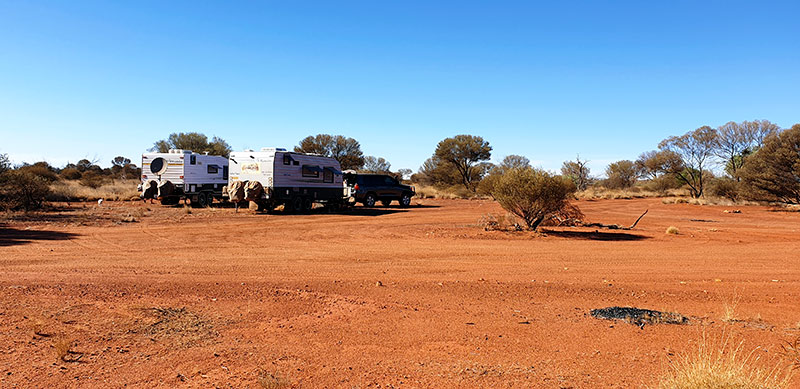
In this article, we are qualifying our definition of ‘offroad’ as driving more than 50km along remote dirt roads on a regular or semi-regular basis. That said, some of the features described here could allow your caravan to traverse much more difficult terrain.
THE CHASSIS
A strong chassis is an absolute must when it comes to an offroad caravan’s survivability when traversing rough roads. The chassis is the foundation on which the caravan is built and many are designed to tackle no more challenging conditions than what you would expect on an asphalt road.
CHECK OUT MARTY’S CARAVANNING BLOG!
Keep in mind that strong doesn’t necessarily mean heavy. Although a good offroad chassis is usually made from thick steel box-section in a ladder frame configuration with lots of cross bracing, some specialised offroad caravan manufacturers have built strong chassis out of much lighter materials.
Talk to the manufacturer if you’re in doubt about the capabilities of the chassis on your caravan.
SUSPENSION
If you want to give your caravan every chance of surviving long trips on corrugated tracks, you’re going to need good suspension with shock absorbers. In my opinion, leaf-spring suspension in any form without shock absorbers is, frankly, archaic.
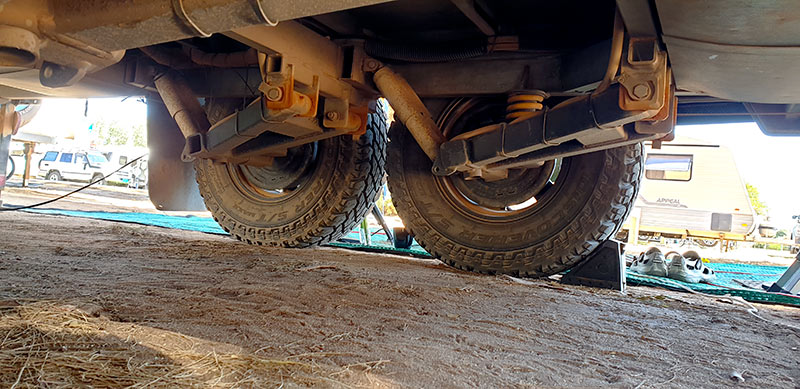
As their name suggests, shock absorbers adsorb shock and, without them, the constant vibrational forces created by driving on corrugations eventually leads to damaged furniture, failed bearings, broken axles and dislodged fittings.
TYRES
Having the best suspension in the world is pretty useless unless the caravan is riding on good quality tyres. As we suggested with the tow vehicle last issue, a good set of brand name all-terrain tyres are ideal for caravans exposed to rough roads.
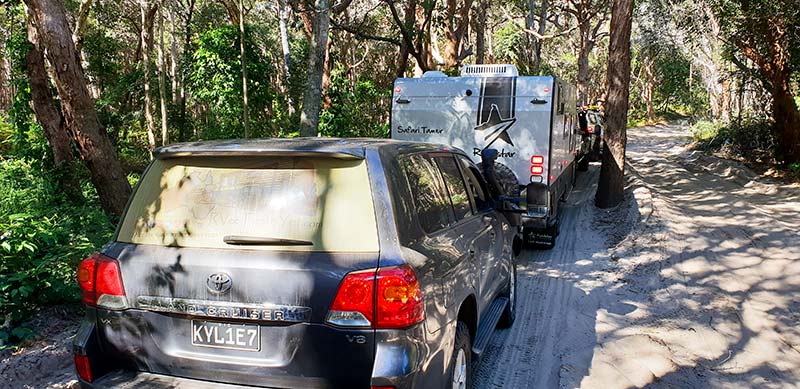
Apart from having excellent load carrying capabilities, all-terrain tyres have strong sidewalls and thick tread to resist punctures and blowouts. The standard tyres fitted to the majority of caravans are totally inadequate in these conditions.
Without question, correct tyre pressures are vital to the survivability of your offroad caravan in offroad conditions.
STONE PROTECTION
You will need adequate stone protection if you intend to do a lot of dirt-road travel. The tyres of the car will send a constant barrage of stones onto the front of your caravan.
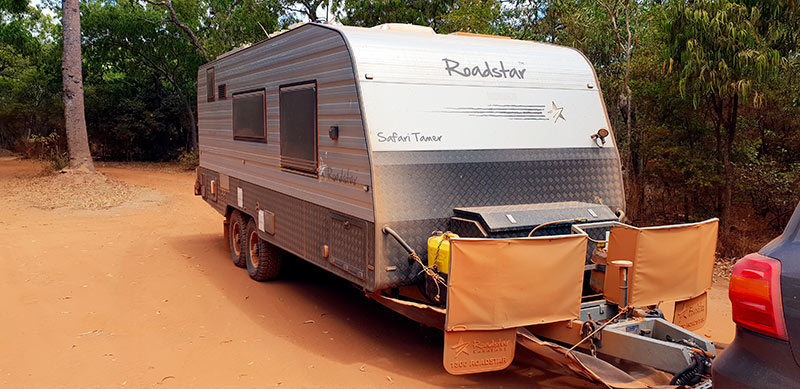
Apart from potentially damaging the front of your van, there is a high risk that some of these stones will ricochet onto the back of the tow vehicle and likely breaking the rear windscreen.
A good stone deflector on the A-frame will deflect these stones harmlessly to the ground.
THE COUPLING
An offroad tow hitch is invaluable in rough conditions. They provide a very secure connection between the tow vehicle and the caravan and also offer a greater range of articulation than a standard ball hitch.
This range of movement is vital in the event of a van rollover. A ball hitch can transfer the rolling forces to the tow vehicle, causing it to roll over as well. An offroad hitch minimises this effect.
DEPARTURE ANGLE
Offroad travel will involve having to negotiate obstacles like spoon drains, dips, creek crossings, and even ferry boarding ramps. In order to avoid getting caught up or damaging the van, a good departure angle is needed.
Most good offroad caravans have a raised rear end or a full cutaway that provides this much needed additional clearance.
SECURING YOUR GEAR
When traversing rough terrain, you have to assume that everything you have stored in the van is likely to move around quite a lot, risking damaging vital components.
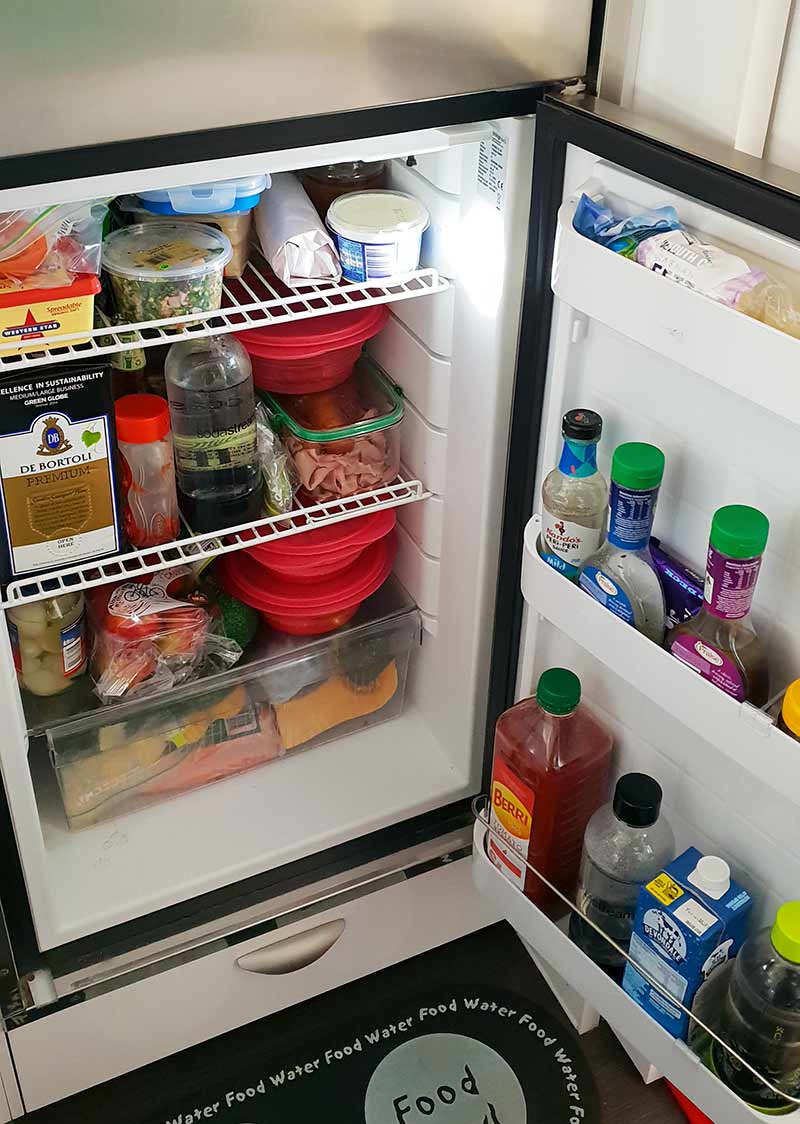
A good offroad caravan will have these components secured in their own compartments where they are not affected by loosely stored items.
PLUMBING AND WIRING
Exposed wiring and plumbing are also a real concern for caravanners who regularly traverse dirt roads. Gravel, stones and rocks flung up from the rig’s tyres causes mayhem to components under the caravan and exposed plumbing is particularly vulnerable to breakage.
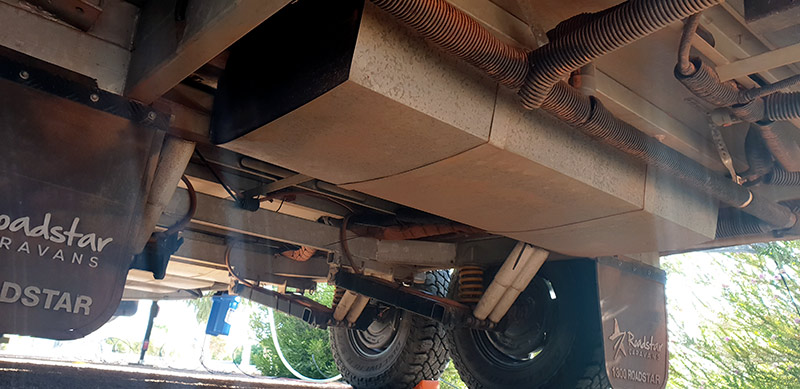
Plumbing and wiring should be run up behind the main beams of the chassis or behind the water tanks to offer some protection against stone damage.
OFFROAD CARAVAN: THE INTERIOR
The interior of the caravan is another area that you need to assess in terms of its suitability to offroad conditions. Cabinetry made from MDF or chipboard is not likely to survive the constant vibrations exerted upon the van from endless corrugations.
Glued and screwed marine ply is much more suitable. Cupboard doors need substantial hinges and locks while draws should have metal runners to minimise vibration.
Make sure the microwave is very well secured. Many caravan owners have opened their van after a dirt road trip to find the microwave shattered on the floor.
SINGLE OR TANDEM-AXLE?
A common question regarding the capability of offroad caravans is whether they should be single or dual-axle. This is a good question. The ultimate answer may depend on how extreme your offroad travels are.
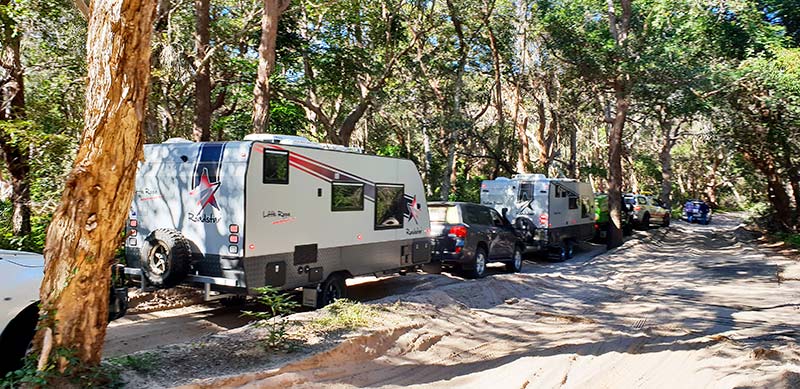
I’ve towed both and while I would absolutely agree a single-axle van is easier to manoeuvre in difficult terrain, in my experience a dual-axle caravan is a lot better to tow for long distances offroad.
Dual-axle vans do not pitch as much as single-axle vans and they are far more stable in undulating terrain. As a result, they exert less influence on the tow vehicle, making the van more comfortable to tow for long distances.


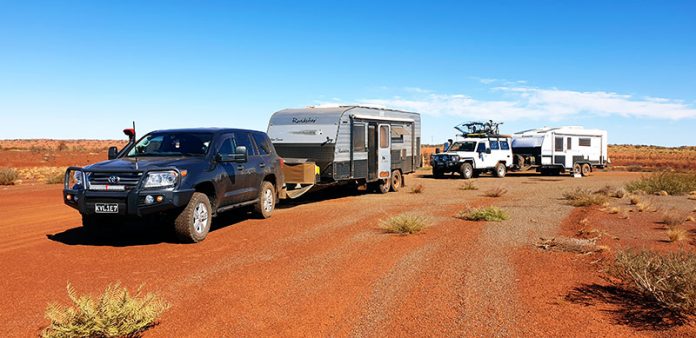

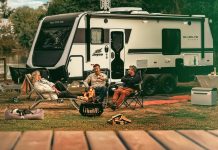
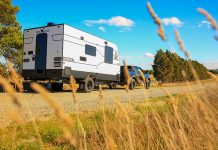

We have owned several vans over the years and the last two full size vans have had airbag, independent dual axle suspensions towed by set-up Landcruisers 200. We have traveled the Great Central, Plenty Hwy, Tanami track, Cape York, Oodnadatta and Birdsville tracks and Gulf country (thousands of km’s) with these vans and have never had any problems. You hardly know that they are on the back. Stone damage has been minimal due to adequate protection. The vans are Trakmaster Nullarbor and Goldstream RV. I would call them “off-road” vans.